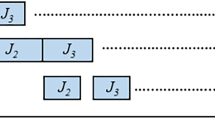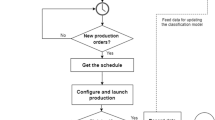Abstract
This paper addresses the single-machine scheduling with general truncated learning effects (GTLE) and delivery times that are past sequence dependent \(({\text {DT}}_\textrm{psd})\). The objective is to determine an optimal job schedule such that makespan, sum of the \(\beta \)th power of job completion times, and total weighted completion time are minimized, where \(\beta >0\) is a given constant. We proved that the makespan, the sum of the \(\beta \)th power of job completion times, and a special case of the total weighted completion time can be solved in polynomial time. For the general case of the total weighted completion time, we propose the heuristic, simulated annealing and branch-and-bound algorithms. Extensive numerical experiments validate the efficiency of the proposed solution algorithms on a set of randomly generated instances. Furthermore, the computational experiment is also conducted to show that the simulated annealing performs effectively and efficiently.
Similar content being viewed by others
Data availability
The data used to support the findings of this paper are available from the corresponding author upon request.
References
Azzouz A, Ennigrou M, Said L-B (2018) Scheduling problems under learning effects: classification and cartography. Int J Prod Res 56(4):1642–1661
Biskup D (1999) Single-machine scheduling with learning considerations. Eur J Oper Res 115:173–178
Cheng TCE, Kuo W-H, Yang D-L (2013) Scheduling with a position-weighted learning effect based on sum-of-logarithm-processing-times and job position. Inf Sci 221:490–500
Cheng TCE, Wu C-C, Chen J-C, Wu W-H, Cheng S-R (2013) Two-machine flowshop scheduling with a truncated learning function to minimize the makespan. Int J Prod Econ 141:79–86
Gawiejnowicz S (1996) A note on scheduling on a single processor with speed dependent on a number of executed jobs. Inf Process Lett 57(6):297–300
He H, Liu M, Wang J-B (2017) Resource constrained scheduling with general truncated job-dependent learning effect. J Comb Optim 33(2):626–644
Jiang Z, Chen F, Zhang X (2022) Single-machine scheduling problems with general truncated sum-of-actual-processing-time-based learning effect. J Comb Optim 43:116–139
Koulamas C, Kyparisis G-J (2007) Single-machine and two-machine flowshop scheduling with general learning functions. Eur J Oper Res 178:402–407
Koulamas C, Kyparisis G-J (2010) Single-machine scheduling problems with past-sequence-dependent delivery times. Int J Prod Econ 126:264–266
Kuo W-H, Yang D-L (2007) Single-machine scheduling with past-sequence-dependent setup times and learning effects. Inf Process Lett 102:22–26
Lai K, Hsu P-H, Ting P-H, Wu C-C (2014) A truncated sum of processing-times-based learning model for a two-machine flowshop scheduling problem. Hum Fact Ergon Manuf Serv Ind 24:152–160
Lee W-C (2011) A note on single-machine scheduling with general learning effect and past-sequence-dependent setup time. Comput Math Appl 62:2095–2100
Liang X-X, Zhang B, Wang J-B, Yin N, Huang X (2019) Study on flow shop scheduling with sum-of-logarithm-processing-times-based learning effects. J Appl Math Comput 61:373–388
Lin R, Wang J-Q, Oulamara A (2023) Online scheduling on parallel-batch machines with periodic availability constraints and job delivery. Omega 116:102804
Liu M (2013) Parallel-machine scheduling with past-sequence-dependent delivery times and learning effect. Appl Math Model 37(23):9630–9633
Liu M, Zheng F, Chu C, Xu Y (2012) New results on single-machine scheduling with past-sequence-dependent delivery times. Theoret Comput Sci 438:55–61
Liu M, Zheng F, Chu C, Xu Y (2012) Single-machine scheduling with past-sequence-dependent delivery times and release times. Inf Process Lett 112(21):835–838
Liu M, Wang S, Chu C (2013) Scheduling deteriorating jobs with past-sequence-dependent delivery times. Int J Prod Econ 144(2):418–421
Mosheiov G (2001) Scheduling problems with a learning effect. Eur J Oper Res 132:687–693
Mosheiov G (2001) Parallel machine scheduling with a learning effect. J Oper Res Soc 52:1165–1169
Nawaz M, Enscore JE, Ham I (1983) A heuristic algorithm for the \(m\)-machine, \(n\)-job flow-shop sequencing problem. Omega 11:91–95
Niu Y-P, Wan L, Wang J-B (2015) A note on scheduling jobs with extended sum-of-processing-times-based and position-based learning effect. Asia-Pac J Oper Res 32(2):1550001
Paredes-Astudillo Y-A, Montoya-Torres J-R, Botta-Genoulaz V (2022) Taxonomy of scheduling problems with learning and deterioration effects. Algorithms 15(11):439
Pei J, Song Q, Liao B, Liu X, Pardalos P-M (2020) Parallel-machine serial-batching scheduling with release times under the effects of position-dependent learning and time-dependent deterioration. Ann Oper Res 298:1–38
Pei J, Zhou Y, Yan P, Pardalos P-M (2023) A concise guide to scheduling with learning and deteriorating effects. Int J Prod Res 61(6):2010–2031
Shen L, Wu YB (2013) Single machine past-sequence-dependent delivery times scheduling with general position-dependent and time-dependent learning effects. Appl Math Model 37:5444–5451
Soroush H-M (2014) Scheduling in bicriteria single machine systems with past-sequence-dependent setup times and learning effects. J Oper Res Soc 65:1017–1036
Sun X, Geng X-N, Liu F (2021) Flow shop scheduling with general position weighted learning effects to minimise total weighted completion time. J Oper Res Soc 72(12):2674–2689
Toksari M-D, Aydogan E-K, Atalay B, Sari S (2022) Some scheduling problems with sum of logarithm processing times based learning effect and exponential past sequence dependent delivery times. J Ind Manag Optimiz 18(3):1795–1807
Wang J-B (2010) Single-machine scheduling with a sum-of-actual-processing-time-based learning effect. J Oper Res Soc 61:172–177
Wang J-B, Wang J-J (2014) Flowshop scheduling with a general exponential learning effect. Comput Oper Res 43:292–308
Wang J-B, Liu F, Wang J-J (2019) Research on m-machine flow shop scheduling with truncated learning effects. Int Trans Oper Res 26(3):1135–1151
Wang J-B, Lv D-Y, Xu J, Ji P, Li F (2020) Bicriterion scheduling with truncated learning effects and convex controllable processing times. Int Trans Oper Res 28(3):1573–1593
Wang J-B, Xue J, Cui B, Gao M (2022) Single-machine scheduling problems with variable processing times and past-sequence-dependent delivery times. Asia-Pac J Oper Res 39(02):2150013
Wang J-B, Zhang L-H, Lv Z-G, Lv D-Y, Geng X-N, Sun X (2022) Heuristic and exact algorithms for single-machine scheduling problems with general truncated learning effects. Comput Appl Math 41(8):417
Wright T-P (1936) Factors affecting the cost of airplanes. J Aeronaut Sci 3(4):122–128
Wu C-C, Lee W-C (2008) Single-machine scheduling problems with a learning effect. Appl Math Model 32:1191–1197
Wu Y-B, Wang J-J (2016) Single-machine scheduling with truncated sum-of-processing-times-based learning effect including proportional delivery times. Neural Comput Appl 27(4):937–943
Wu C-C, Yin Y, Cheng S-R (2011) Some single-machine scheduling problems with a truncation learning effect. Comput Ind Eng 60:790–795
Wu C-C, Yin Y, Wu W-H, Cheng S-R (2012) Some polynomial solvable single-machine scheduling problems with a truncation sum-of-processing-times based learning effect. Eu J Ind Eng 6(4):441–453
Wu C-C, Yin Y, Cheng S-R (2013) Single-machine and two-machine flowshop scheduling problems with truncated position-based learning functions. J Oper Res Soc 64(1):147–156
Yin N, Kang L-Y, Ji P, Wang J-B (2014) Single machine scheduling with sum-of-logarithm-processing-times based deterioration. Inf Sci 274:303–309
Zhao S (2022) Scheduling jobs with general truncated learning effects including proportional setup times. Comput Appl Math 41(4):146
Acknowledgements
This work was supported by LiaoNing Revitalization Talents Program (XLYC2002017), the SongShan Laboratory Foundation (YYJC062022017), and the Open Fund of the State Key Laboratory of Air Traffic Management System and Technology (SKLATM202101). Finally, we would like to thank the referees for their insightful comments which helped us improve an earlier version of this paper.
Author information
Authors and Affiliations
Corresponding author
Ethics declarations
Conflict of interest
The authors declare no conflict of interest.
Additional information
Communicated by Hector Cancela.
Publisher's Note
Springer Nature remains neutral with regard to jurisdictional claims in published maps and institutional affiliations.
Appendix
Appendix
Lemma 1
If the parameters \(A>0\), \(\lambda \le 1\) , \(f'(y)\le 0\), \(f''(y) \ge 0\), and \(m''(y)\le 0\), then \(K(y)=\frac{\lambda \max \{f(A+m(y))h(k+1),\theta \}-\max \{f(A)h(k),\theta \}}{y}\) is a non-decreasing function on y; if \(m(0)=0\), \(h(1)=1\) , \(0 \le \theta \le 1\), and \(y\ge 1\) , then h(k) is a non-increasing function.
Proof
The proof of this lemma will be discussed in the following three cases:
-
(i)
If \(f(A+m(y))h(k+1)\ge \theta \), then \(f(A)h(k)\ge \theta \), it follows that
$$\begin{aligned} K(y)=\frac{\lambda f(A+m(y))h(k+1)-f(A)h(k)}{y} \end{aligned}$$then,
$$\begin{aligned} K'(y)=\frac{\lambda f'(A+m(y))h(k+1)m'(y)y-\lambda f(A+m(x))h(k+1)+f(A)h(k)}{y^2} \end{aligned}$$Let
$$\begin{aligned} H(y)=\lambda f'(A+m(y))h(k+1)m'(y)y-\lambda f(A+m(y))h(k+1)+f(A)h(k) \end{aligned}$$it follows that
$$\begin{aligned} H'(y)=\lambda yh(k+1)[f''(A+m(y))(m''(y))^2+f'(A+m(y))m''(y)] \end{aligned}$$by \(f'(y)\le 0, f''(y)\ge 0, m''(y)\le 0\), it follows that \(H'(y)\ge 0\), \(H(y)\ge H(0)=f(A)(h(k)-\lambda h(k+1))\ge 0\). Thus, \(K'(y)\ge 0\), i.e., K(y) is a non-decreasing function on y.
-
(ii)
If \(f(A+m(y))h(k+1)< \theta \), \(f(A)h(k)\ge \theta \), then \(K(y)=\frac{\lambda \theta -f(A)h(k)}{y}\) is a non-decreasing function on y.
-
(iii)
If \(f(A+m(y))h(k+1)< \theta \), \(f(A)h(k)<\theta \), then \(K(y)=\frac{(\lambda -1)}{y}\) is a non-decreasing function on y.
\(\square \)
Rights and permissions
Springer Nature or its licensor (e.g. a society or other partner) holds exclusive rights to this article under a publishing agreement with the author(s) or other rightsholder(s); author self-archiving of the accepted manuscript version of this article is solely governed by the terms of such publishing agreement and applicable law.
About this article
Cite this article
Ren, N., Wang, JB. & Wang, E. Research on delivery times scheduling with truncated learning effects. Comp. Appl. Math. 42, 243 (2023). https://doi.org/10.1007/s40314-023-02379-7
Received:
Revised:
Accepted:
Published:
DOI: https://doi.org/10.1007/s40314-023-02379-7
Keywords
- Scheduling
- Truncated learning effect
- Past sequence dependent delivery time
- Branch-and-bound
- Heuristic
- Simulated annealing




